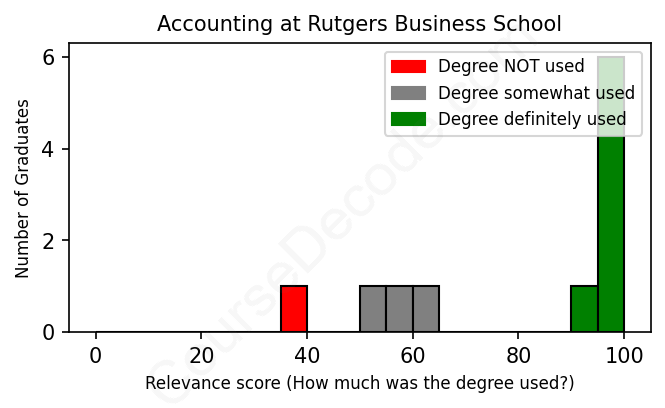
First, some facts. Of the Accounting graduates from Rutgers Business School we've analyzed , here's how many have used (or NOT used) their degree in their career:

These are estimates based on AI analysis of 11 LinkedIn profiles (see below).
The verdict? Significantly above average. Overall, with an average relevance score of 81%, Accounting graduates from Rutgers Business School have a much higher likelihood (+14%) of finding work in this field compared to the average graduate across all fields:
And for comparison, here's the chart for all profiles we've looked at across all degrees.
Also, after graduating, only 18% of these graduates have pursued further education other than another Bachelor's degree (such as a Masters degree or other), compared to the average across all profiles of 35%. This suggests a Bachelors degree is enough for most Accounting graduates, and it's normal to look for work straight after graduation.
See the details:
|
Relevance score: 59% We think this person has gone into a career only somewhat relevant to their degree. We think this person has gone into a career only somewhat relevant to their degree.
DEGREE INFOGraduated in 2021 from Rutgers Business School with a Bachelor's degree in Accounting. No other secondary education since. JOB HISTORY SINCE GRADUATIONFLDP Associate Transfer Pricing Johnson & Johnson Jul 2021 - Jan 2023 FLDP Analyst DePuy R&D  Johnson & Johnson Jan 2023 - Jan 2024 Senior Financial Analyst Acquisitions & Divestitures Operations  Johnson & Johnson Jan 2024 - Present ABOUTNo information provided. |
The top 10 most common jobs done by the graduates we've analyzed (ranked most common to least) are:
From the analysis of LinkedIn profiles of Rutgers Business School accounting graduates, it seems that a variety of job titles pop up, indicating a mix of direct and indirect relevance to accounting. The most common jobs these graduates hold include positions like Auditor, Revenue Analyst, Risk Management Internal Auditor, and various roles within accounting departments such as Accounts Payable Coordinator and Payroll Assistant. These roles typically require solid accounting knowledge and skills that the graduates would have learned during their degree programs, aligning well with the primary focus of their studies.
However, not all positions are deeply rooted in accounting principles. Some individuals have taken on roles like Executive Consultant or Project Coordinator, which may benefit from some business acumen gained during their education but lack core accounting relevance. This pattern shows that while many graduates do find their way into accounting-related roles, a significant number venture into areas where their degree isn't directly applied. Overall, it's a mixed bag; many are applying what they've learned in their accounting degree, but some are also exploring broader or tangential career paths that lean less heavily on traditional accounting skills.
Here is a visual representation of the most common words in job titles for Accounting graduates (this is across all Accounting graduates we've analyzed, not just those who went to Rutgers Business School):

Looking at the career paths of graduates from Rutgers Business School who majored in Accounting, it's clear that many of them are finding solid footing in finance-related roles straight out of college. The first jobs tend to fall into categories like auditors, financial analysts, or accounts payable coordinators. For instance, a lot of recent grads have jumped into positions at reputable companies, working as auditors, tax analysts, or even in corporate banking. This shows that many are landing roles that are well-aligned with their degree and offer a good starting point for their careers.
Fast forward five to ten years, and you'll see a trend where many of these individuals are moving up the ranks. Some have transitioned into more advanced roles like senior internal auditors, controlling analysts, or even into executive consulting positions. While there's a mix—some graduates have switched industries or taken on roles that aren't strictly accounting-related—most seem to be sticking close to the field and making reasonable career advancements. Overall, the career trajectories suggest that Rutgers Accounting grads generally find themselves in good jobs relevant to their degree, making steady progress in their careers.
Getting a Bachelor’s degree in Accounting at Rutgers Business School can be a bit challenging, but it really depends on your strengths and interests. If you're good with numbers and like problem-solving, it might feel more manageable for you. Generally speaking, accounting programs can be tougher than some other degrees because they involve a lot of detailed work, like financial analysis and understanding complex regulations. You’ll definitely have to put in some time studying, especially for those intro classes like Financial Accounting and Managerial Accounting. So, while it’s not impossible, be prepared for some late nights with textbooks and practice problems along the way!
Most commonly, in the LinkedIn profiles we've looked at, it takes people 4 years to finish a Bachelor degree in Accounting.
Looking at these Rutgers Business School grads, it seems like they’re generally doing pretty well money-wise, especially for recent grads. The fact that some of them have moved into solid roles like Senior Internal Auditor or Senior Financial Analyst at big names like Morgan Stanley and Johnson & Johnson suggests they’re likely pulling in decent salaries. The older grads, like the executive consultant and auditors, also seem to have stable positions, which usually means they’ve climbed the financial ladder. Overall, it appears they’re on a good track with their careers, and while I can't tell exact salaries, many of these jobs typically come with solid pay and benefits, especially in the accounting field.
Here is a visual representation of the most common words seen in the "about" section of LinkedIn profiles who have a Bachelor degree in Accounting (this is across all Accounting graduates we've analyzed, not just those who went to Rutgers Business School). This may or may not be useful:

Here are all colleges offering a Bachelor degree in Accounting (ordered by the average relevance score of their Accounting graduates, best to worst) where we have analyzed at least 10 of their graduates: